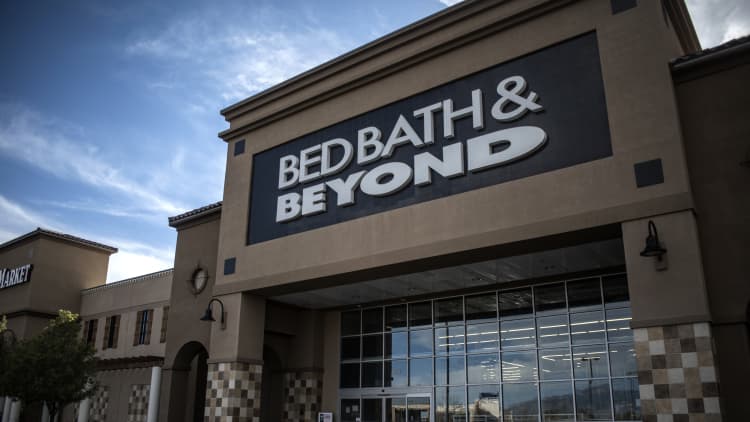Bed Bath & Beyond reported Wednesday fiscal second quarter profits that beat analyst estimates but fell short on revenue and same-store sales.
Here's what the company reported compared with what Wall Street expected, based on a survey of analysts by Refinitiv:
- Adjusted earnings per share: 34 cents vs. 27 cents expected
- Revenue: $2.72 billion vs. $2.752 billion expected
- Same-store sales: down 6.7% vs. down 5.44% expected
The company also said that it "has made substantial progress toward identifying a permanent CEO" and said it expects to make an announcement within weeks. Steven Temares resigned from the top job in May, and was succeeded in the interim by Mary Winston.
The company said in an earnings call that it plans to close 60 of its stores by the end of fiscal 2019, including about 40 Bed Bath & Beyond stores and 20 stores from other concepts. It previously said it would close just 40 stores in 2019.
Bed Bath & Beyond shares were recently down 2% in extended trading.
"Our second quarter financial results reflect the relentless effort of our teams and our progress in driving the Company's transformation efforts to delight our customers, enhance our competitive position, improve our financial performance, and drive shareholder value," Winston said in a statement.
Bed Bath & Beyond has long been trying to climb out of a deep hole of excess inventory and chaotic discounting and stores. The retailer continues to lose relevancy and leaves investors wondering if it has a future. Its stock has fallen 28% in the past year, with a market value of $1.2 billion.
As part of the process to declutter stores, Winston said that more than $350 million in inventory will be removed from stores before the holiday season, through markdowns, clearance events, and an independent liquidator.
The company has focused on four key near-term priorities, to turnaround its business including: stabilizing sales and driving top-line growth; resetting the cost structure; reviewing and optimizing its asset base, including the portfolio of retail banners; and refining its organization structure.
It swung to a net loss of $138.7 million, or $1.12 a share, compared with profit of $48.6 million, or 36 cents a share, a year earlier. Adjusted for one-time items such as severance costs and inventory write downs, the retailer earned 34 cents a share, topping estimates of 27 cents per share, from a Refinitiv survey.
Same-store sales fell 6.7% for the quarter ended Aug. 31, while analysts had expected a 5.44% decline. That marks the tenth-straight quarter of same-store sales declines for the home goods retailer.
For the fiscal year, the company forecasts $11.4 billion in net sales. Previously, the company estimated sales would fall in the lower end of a range of $11.4 billion to $11.7 billion. It also expects earnings of between $2.08 and $2.13 per share for the fiscal year, narrower than previous guidance of $2.11 to $2.20 per share.
But in the past few months, a revamped board has been seeking to transform the company. In April 2019, a trio of activist investors urged the company to overhaul the board in order to "stem the tide of value destruction."
Some analysts are optimistic about the structural changes. On Monday, WedBush upgraded the company to outperform from neutral. It said improved governance and a plan to declutter stores before the holiday season has led to "a good chance of stabilization — if not growth — in earnings over the next two years," analyst Seth Basham wrote.
Bed Bath & Beyond's plans to sell off its non-core assets, such as Buy Buy Baby and Cost Plus World Market, also might be a bright spot in its future. Basham estimates all of its non-core and real estate assets combined would be worth about $1.7 billion.
On Tuesday, the company also launched a gift experiences option to its wedding registry category, following the footsteps of Target. The option allows consumers to choose an experience such as outdoor getaways and spa visits to their registries.

— CNBC's Jasmine Kim contributed to this report.


